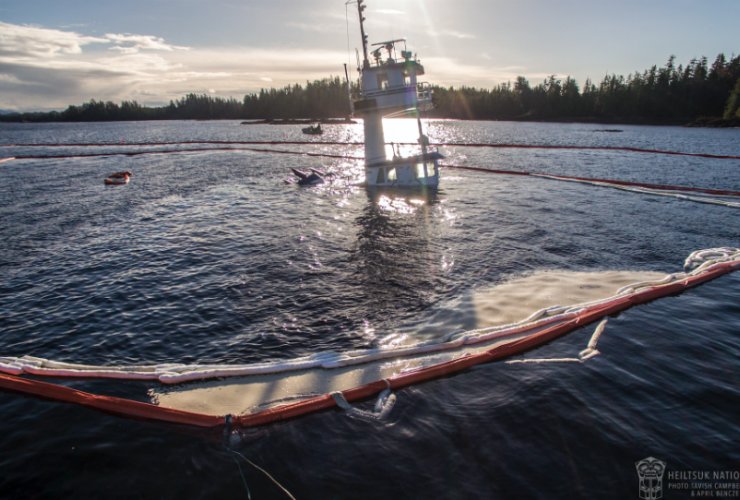A loaded fuel barge that broke away from its tug off British Columbia's central coast was being towed to safety on Monday as the threat of a spill diminished, officials said.
The barge, loaded with 3.5 million litres of diesel and 468,000 litres of gasoline, was set to anchor off Campbell Island in the Inside Passage.
A U.S.-registered tugboat, the Jake Shearer, was pushing the barge through Queen Charlotte Sound when it broke free southwest of Bella Bella on Sunday.
Roger Girouard, assistant coast guard commissioner, said the vessel encountered strong seas and suffered damage, which broke the pin arrangement connecting the tug to the barge.
"The control of the barge was lost and the barge started drifting onto the B.C. coast," he said.
On Sunday evening, the barge crew laid an anchor, which held and kept the barge off the rocks near Goose Island, Girouard said.
He said coast guard resources, including the Norman Reid, arrived on the scene in stormy weather. A decision was made to let the anchor hold as conditions were expected to improve.
"We watched and were ready just in case the anchor did drag, but it did not," he said.
The tugboat Gulf Cajun picked up the barge — identified by the Joint Rescue Co-ordination Centre as the Zidell Marine 277 — and it was scheduled to reach its destination off Campbell Island on Monday evening.
Washington state-based Harley Marine Services owns both the tug and barge. Vice-president of safety Rich Softye said the incident is regrettable.
"We're doing a full investigation to make sure that if there's anything that is a problem on the operation side that could have been changed, we will change," he said.
The company was also speaking with the manufacturer of the linking system, he said.
He said the company has been using so-called articulated tug barges — where a tug pushes a barge rather than pulls it — for years and has never had any safety issues.
"We were hit by a couple of very large waves, cross-wise, from the port side that caused everything to be slammed over," he said. "With that, the separation took place."
Articulated tug barges are more fuel-efficient and require fewer crew members than traditional tugboats, but they are more difficult to control in rough seas or bad weather, said Mike Fitzpatrick, president and CEO of Robert Allan Ltd., a naval architecture and marine engineering firm.
"If you're in really rough weather, barges need to be towed. If you're in sheltered waters, they can be pushed," he said.
Girouard said the tug was en route from Seattle to Alaska and was in international waters, defined as being more than 12 nautical miles from Canada's shoreline, when it hit heavy weather.
After the Nathan E. Stewart sank near Bella Bella and spilled 110,000 litres of diesel last year, greater restrictions were placed on access to Canadian waters by U.S. tugboats, he said.
"This, along with the Nathan E. Stewart spill, will cause us to take a look at the spectrum of rules and the guidance that this type of vessel has along Canadian waters," he said.
Heiltsuk First Nation Chief Marilyn Slett said her community is still recovering from last year's spill and this latest incident shows a response centre is needed on the central coast.
She called on the federal government to help fund an Indigenous response centre that would have equipment and vessels as well as training and certification for its members.
"We can't continue to hope, as we did last night when the anchor dropped," she said. "We have to do better than that. We have to make sure the infrastructure and capacity are in our communities."





Comments